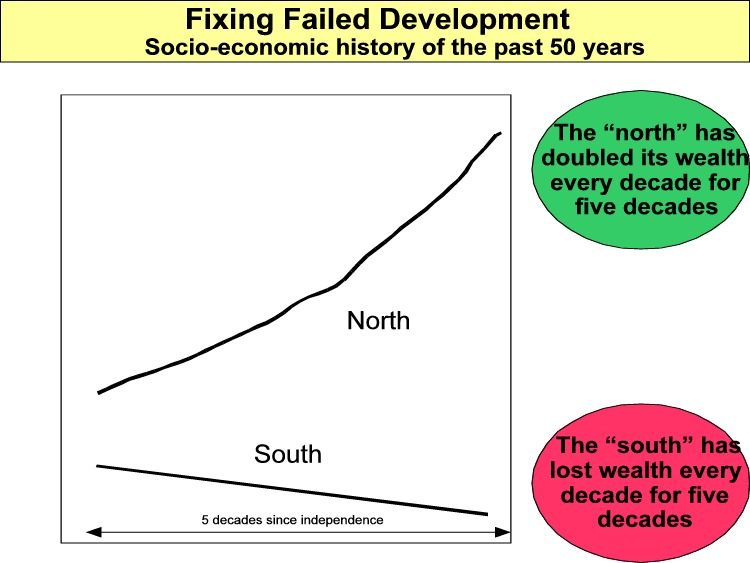|
5000 years of very slow progress ... until very recently
There was very little change for several millennia, but in the recent past ... that is, the last 300 years ... incredible change.

We are no longer in a world where shortage and hunger are endemic ... and insoluble. Rather we have a planet where there is the possibility for everyone to be out of poverty and enjoying a reasonable standard of living ... but there are systemic issues that make progress impossible for as much as half the world's population.
Though some take pride in the progress as measured by corporate profit performance, stock market prices, and personal money wealth ... others are looking at the continued high levels of poverty, hunger and disease, and the vast amount of waste that characterizes modern society. The universal goal in the modern capitalist economy is more and more GDP growth.
I argue that achievement over the past fifty years has been pathetic compared to what they could have been ... what should have been! The power of science and technology has progressed at an amazing rate, but the actual achievements are modest relative to the possibilities.

I drew this sketch a number of years ago, early in the Internet era before the incredible progress of the last decade. Already the issue was clear, but it is now even clearer.
Why is this? How is this? The progress and power of science and technology has been far more than expected ... it is amazing ... it is accelerating ... it offers huge potential. But why has science and technology not translated into a much better quality of life. A relatively few have multibillions of dollars of wealth while others are scraping by and a huge population live in abject poverty around the world.
Achievement is so much less than what might have been expected ... there is something terribly wrong and it there sem to be no leaders who can articulate what is wrong. There is a systemic failure of some sort ... and the discussion is mainly ideological with little attention to what the data show.
50 years ago ... great expectations
50 years ago, in the 1960s, the economic power of the United States was at a peak ... WWII had been won ... Europe was rebuilding and intenrational development expectations were positive. There was the expectation that the economies of the 'North' would continue to grow, and there was also the expectation that the poor economies of the newly independent countries would grow as well.

The prevailing view was that independence was going to result in a new a better global society. It was expected that the North would progress and that the South would start to catch up.

What has happened has been very different ... North has had continuing success and the South has largely failed. The north has doubled its wealth every decade for the past five decades. Rich get richer ... poor get poorer. The South has lost wealth every decade for five decades.
There are some successes ... and the lesson from this is that there could have been much wider success if the governance, the leadership and the system had been tolerably effective.
The result is failed development with about half the population of the planet in poverty, hungry and diseased.
The North has done better than the expectation due to amazing scientific and technological progress. The South reflects the tragic impact of failed development.
We know enough to have had some successes ... the fact of failure suggests something is terribly wrong. Compared to where we could be ... where we should be ... we have failed. There is an obscene amount of poverty, hunger and disease and leadership does not seem to be much capable of making material improvements.
Diminished development expectations
The north is going to have a difficult future because of an approach that depends on unsustainable consumerism and unfriendly global partnerships. As population increases and as aspirations are dashed and hopelessness increases there will be more and more instability and insecurity. This is not a good future scenario. The south has no leverage to change anything, and its deterioration will further fuel global insecurity.

My take is that this rather dismal scenario does not have to play out. Technology can be used so that there is continuing progress in the North and with favorable global cooperation, the South can progress as well. The South has a huge capacity to progress, but there needs to be cooperation.
This will play out with a new geopolitical balance of power where the old economic predominance of the United States and Western Europe is overtaken by countries like Brazil, Russia, India and China driving progress together with powerful new alliances involving raw materials and energy. There is a better way ... the north has all sorts of possibilities with well intentioned global cooperation. The south has huge capacity in terms of human resources and raw materials but needs well intentioned global cooperation to make these abundant resources productive and valuable.
A better development paradigm is not more money spent the same old way ... it is one where the legitimate hopes and aspirations of the multi-billion people in poverty can start to be fulfilled.
Science and technology have huge potential. But this knowledge needs to be mobilized for social good and not merely for a rather limited profit goal. People have a huge potential for doing good ... but the framework for this must be established.

//////////////////
I argue that a big part of the failure is the lack of metrics that show what is being successful and what is not. It is difficult, if not impossible to manage what you do not measure.
| 
